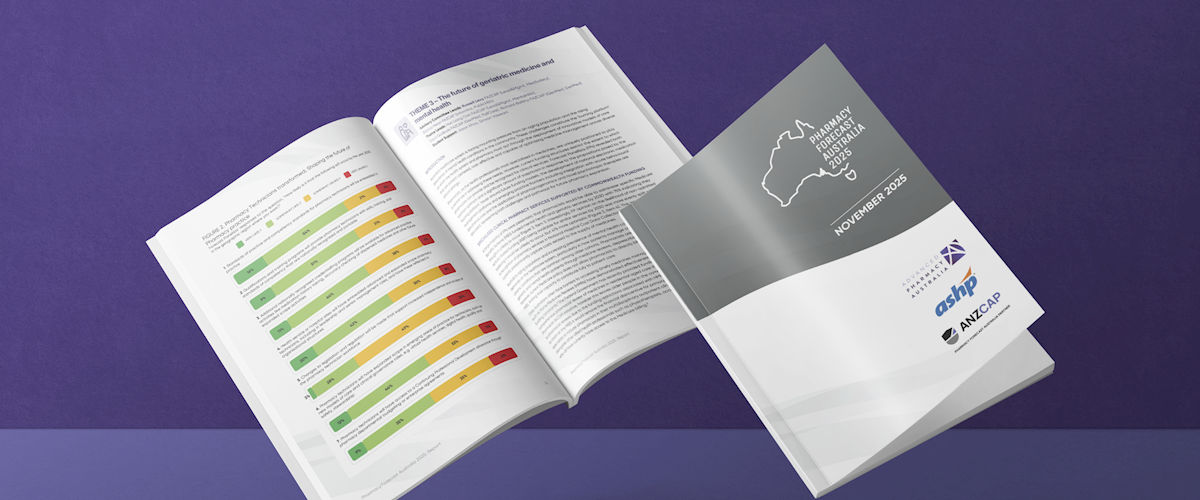Wed 12 November 2025
Innovation, sustainability, AI and the next ‘black swan’: Forecasting pharmacy to 2030
Advanced Pharmacy Australia (AdPha) has today released the fifth edition of Pharmacy Forecast Australia (PFA25), examining emerging trends and phenomena across mental health care, advanced therapeutics, AI use in healthcare and workforce development, with a spotlight on the rapidly evolving remit of pharmacy technicians.
Pharmacy leaders informed 42 recommendations – including calls to strengthen workforce models and recognition pathways, safely manage rising technologies, and embed sustainability and equity – a ‘guiding light’ for the profession at a pivotal juncture in pharmacy and healthcare.
Peter Smart FANZCAP (Lead&Mgmt), Pharmacy Forecast Advisory Committee (PFAC) Chair, says this year’s analysis and recommendations are among the most comprehensive, as the Forecast goes from strength to strength.
‘It is a privilege to work with data from the coalface that is so representative, from pharmacy leaders of hospitals and health services of all sizes, in regional and metro areas across every state and territory.
‘Pharmacy Forecast Australia began in the depths of the Covid-19 pandemic but, five years on, it felt timely to introduce the “black swan” to our edition, which has been a staple of the ASHP Foundation’s Pharmacy Forecast for over a decade.
‘The new chapter explores pharmacy and healthcare preparedness for events that are rare, unpredictable, significantly disruptive and profoundly consequential. With PFA25 chapters also exploring tangible impacts of the climate emergency and the rapid ascent of AI, the report provides well-rounded and actionable recommendations to ensure we are ready.’
President Assoc. Prof Tom Simpson FANZCAP (Lead&Mgmt) says the insight of PFA25 is crucial to supporting strategic planning in pharmacy across Australian hospitals and adjacent care settings.
‘We’re proud to platform the insight of leading members, revealing the lived reality of current health care challenges: what is coming in the immediate future and how strategic planning can be optimised to harness opportunities in a changing world.
‘Strengthening workforce models, embracing advanced therapeutics and technology, and embedding sustainability and equity will ensure the profession remains resilient, adaptable, and central to Australia’s future healthcare system.
‘Pharmacy Forecast Australia 2025 provides crucial data and analysis, acting as a guiding light during what is a time of great change in pharmacy and healthcare.
‘When coupled with AdPha’s State of Pharmacy: Workforce Insights 2025 report, due for release later this month – PFA will provide the most comprehensive view yet of advanced pharmacy in Australia, and concrete actions we can take to improve patient outcomes in our hospitals, aged care, general practice and at transitions of care.’
Pharmacy Forecast Australia 2025 (PFA) is now available
At a glance
Notable data points:
- 86% of hospital pharmacy leaders see advanced pharmacy having a vital role in delivering care beyond the hospital walls, supporting patients wherever they are.
- Almost 2 in 3 pharmacy leaders see advanced technicians in expanded scope and leadership roles across health services
- Over half of hospital pharmacy leaders expect new pharmacy post-grad courses in mental health and geriatrics by 2030 to meet rising demand for skilled pharmacists across care settings.
- Over half of hospital pharmacy leaders believe the sector will lead national governance and quality use of advanced therapeutics, less than one third expect the cost of providing them to be included in health service budgets.
- 82% of hospital pharmacy leaders believe we will see an increase in prevalence of diseases that are a direct result of drivers such as climate change and political instability.
- 82% of hospital pharmacy leaders expect most consumers will routinely use AI as a trusted second opinion to their healthcare professional.
Key recommendations:
- Set clear national benchmarks for hospital pharmacy services that drive quality, accountability, and real-time insight.
- Link learning to lasting careers, ensuring education and recognition reforms open genuine pathways for the pharmacy workforce.
- Empower technician growth, utilising the new Australasian Competency Standards Framework for pharmacy technicians in hospitals and health services (2025) to lift service quality, safety, and career potential.
- Unlock full technician scope and impact, extending legislative and regulatory reform to recognise and elevate the technician workforce.
- Invest for equitable access to advanced therapeutics; dedicate funding and incentives to increase availability across Australia, ensuring pharmacists are core members of related governance committees.
- Champion mental health precision care, supporting pharmacists to integrate pharmacogenomics and precision medicine into practice.
- Unify electronic medication management; deliver a single eNRMC system that’s secure, PBS-compliant, and accessible across all care settings, backed by training and capacity-building.
- Drive safe digital adoption, pairing new AI and IT tools with practical training and ongoing research on real-world impact.
- Promote digital accountability, defining pharmacy leaders’ IT responsibilities, vendor transparency, and digital competency standards.
- Support Australian-made medicines, prioritising local manufacturing to strengthen supply, sustainability, and resilience.
- Combat health misinformation, embedding information literacy and critical thinking in pharmacy education and standards.


